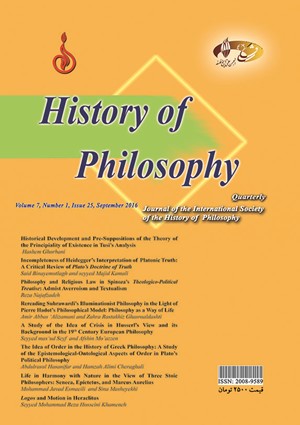Incompleteness of Heidegger’s Interpretation of Platonic Truth: A Critical Review of Plato’s Doctrine of Truth
Subject Areas : Geneology of philosophical schools and IdeasSaid Binayemotlagh 1 , seyyed Majid Kamali 2
1 -
2 -
Keywords: truth (aletheia) beauty idea of the good (agathon) Plato unhiddenness Heidegger Existence,
Abstract :
In his treatise of Plato’s Doctrine of Truth, by referring to Plato’s “Allegory of the Cave”, Heidegger intends to demonstrate that the meaning of truth in Platonic philosophy underwent some transformation comparing to how pre-Socratic Greeks defined it. Here, truth as unhiddenness is reduced to truth as “true” and “correspondence”. The purpose of the present paper is to explain that Heidegger’s interpretation of Platonic truth does not cover all of Plato’s ideas regarding the meaning of truth. Accordingly, by referring to some of Plato’s ideas regarding, for example, “good”, “beauty”, “existence”, and “truth”, the writers have tried to disclose some of the contradictory points of Heidegger’s interpretation of the meaning of truth in Plato’s philosophy. They have also tried to demonstrate that Heidegger’s reading of Plato is reductionist in nature, and that downgrading the meaning of truth merely to the level of “true” and “correspondence”, more than being based on Plato’s documented ideas, originates in Heidegger’s will to call the whole history of Western philosophy as Western metaphysics.
افلاطون، دوره کامل آثار، ترجمه محمدحسن لطفي، تهران، انتشارات خوارزمي، ج3، 1367. #
افلاطون، ضيافت، ترجمه محمدعلي فروغي، تهران، انتشارات جامي، 1385. #
التنبرند جانسون، پاتريشيا، راه مارتين هايدگر، ترجمه سيدمجيد کمالي، تهران، نشر مهر نيوشا، 1388. #
زينلي مهرآباد، زهرا، «جايگاه اخلاق در هرمنوتيک گادامر»، پژوهشهاي فلسفي، ش13، بهار و تابستان 1387. #
فتحي، حسن، «اصطلاحات مورد استفاده افلاطون درباب نظريه مثل»، فصلنامه علاّمه، ش10، تابستان 1385. #
گادامر، هانس گئورگ، مثال خير در فلسفه افلاطوني - ارسطويي، ترجمه حسن فتحي، تهران، انتشارات حکمت، 1382. #
Bernasconi, Robert, The Question of Language in Heidegger’s History of Being, Humanities Press, 1989. #
Berti, Enrico, “Heidegger and Platonic Concept of Truth”, in Partenie, Catalin & Rockmore, Tom, Heidegger and Plato: Toward Dialogue, Northwestern Universiry Press, 2005. #
Heidegger, Martin, On the Way to Language, translated by D. Hertz, Peter, San Francisco: Harper, 1982. #
Heidegger, Martin, “Platons Lehre von der Wahrheit”, in Wegmarken, vittorio klostermann, 1975. #
Heidegger, Martin, Being and Time, translated by Macquarrie, John & Robinson, Edward, San Francisco: Harper, 1962. #
Heidegger, Martin, Plato’s Sophist, translated by R. Rojcewicz and A. Schuwer, Bloomington and Indianapolis: Indiana University Press, 1997. #
Heidegger, Martin, The Essence of Truth, translated by Sadler, Ted, London: Continuum, 2002. #
Heidegger, Martin, “Zeit und Sein”, in Zur Sache des Denkens, vittorio klostermann, 2007. #
Inwood, Michael, A Heidegger Dictionary, Blackwell Publishers Ltd, 1999. #
Gadamer, Hans-Georg, The Idea of the Good in Platonic-Aristotelian Philosophy, translated by P. Christopher Smith, New Haven, Yale University Press, 1986. #
J. Gonzalez, Francisco, “Plato and Heidegger: A Question of Dialogue”, Philadelphia: Penn State Press, 2009. #
Lonescu, Cristina, “Review of Robert Merrihew Adams; A Theory of Virtue: Excellence in Being for the Good”, in Dialogue, volume 49, Issue 2, 2010. #
Ross, S.W.D., Plato’s Theory of Ideas, Oxford, The Clarendon Press, 1951. #
Sadler, Ted, Heidegger and Aristotle: The Question of Being, The Athlone Press, 1996. #
Wachterhauser, B., Beyond Being, Gadamer’s Post-Platonic Hermeneutic Ontology, Evanston, Northwestern University Press, 1999. #
Wrathall, Mark, “Heidegger on Plato, Truth, and Unconcealment: The 1931-32 lecture on the Essence of Truth”, in Inquiry: An Interdisciplinary Journal of Philosophy, volume 47, Issue 5, 2004. #


